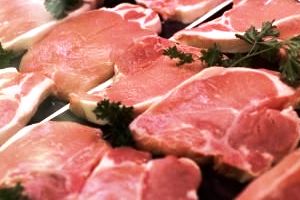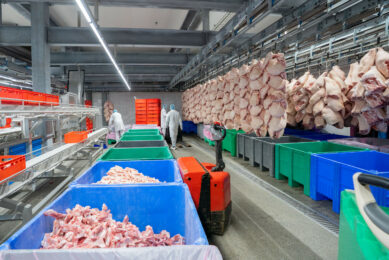China fears inflation as pig prices soar

China’s pig producers are selling, causing the price of pork to drop dramatically. Paired with sluggish domestic demand, decreasing herd sizes, and rising feed prices, economists fear higher consumer prices next year.
China’s food price cycle is driven in a large part by pork, the country’s staple meat, and while it is in abundance now, in about six months meat stocks are expected to fall as a result of the sell-off, resulting in a surge in prices.
China’s economic planning agency this month ordered stockpiling of frozen pork in anticipation of a supply squeeze when consumption peaks next February, revealing its fears for the industry.
China holds reserves of pork, both in live animals and frozen meat, to help stabilize domestic prices during extreme price fluctuations. The stockpiling is also used to try to curtail food inflation and steady its domestic industry.
In 2007, rapidly rising pork prices became a national concern when China’s hog industry, responsible for producing 50 million tonnes, or half of the world’s pork, a year, suffered a deadly outbreak of blue ear disease.
Some analysts are saying, however, that the impact on food rpices may limited as demand for pork weakens and China’s economy falters.
Feed costs bound upwards
The high price of pork domestically had pig farmers busy rebuilding their herds in the late winter and early spring, but by summer the cost of feed had shot through the roof.
The worst US drought in 56 years has pushed the price of corn and soybean, and consequently feed products to record highs.
The surge in prices has hurt China’s livestock industry, which imports 60% if soybeans traded globally and is the world’s sixth largest corn importer. Small farmers, who account for about 30 percent of China’s pork production, have been the first to take a hit as they have struggled to meet rising feed costs.
“If you look at corn and soymeal prices in China, the cost of feeding animals is already reaching a record,” said Jean-Yves Chow, a senior feed industry analyst at Rabobank in Hong Kong.
“We expect pork supplies to decline by early next year if profitability remains depressed, resulting in higher prices which will fuel food inflation.”
In 2007, China and Hong Kong imports surged due to the shortfall of domestic pork production after herds were decimated by blue ear disease. Among the beneficiaries were American farmers.
Sources
Reuters
Chicago Tribune
China.org.cn











